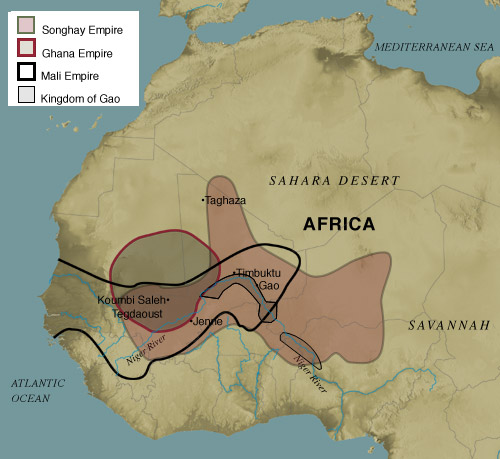Sudanic Empires of Western Africa
The Sudanic empires of Western Africa were a group of powerful states that developed south of the SAHARA DESERT between the A.D 700s and 1500s. The most prominent of these states were GHANA, MALI, and Songhai. The Arabs called the whole stretch of land south of the desert bilad al-sudan (“the land of the blacks”). Thus the term “Sudan” came to mean the area ranging from the present-day nation of SUDAN through western Africa. The Sudanic empires developed vast commercial networks, trading grains and gold from the SAHEL and sub-Saharan Africa for salt from the Sahara.

History and Government
Ghana, the first great Sudanic trading empire, was founded by Soninke peoples. By about 800 Ghana was a wealthy kingdom, and it reached its peak in the mid-1000s. Soon afterward the empire began to decline as the Almoravids, a Muslim group from North Africa, gained control of the Saharan trade routes and parts of the Sudan. Although Ghana survived until the 1200s, it never regained its former power.
In the early 1200s a group of southern Soninke peoples known as the Susu began gaining influence in the region. However, they were conquered in the mid-1200s by SUNDJATA KEITA, the king of the Malinke.
Sundjata took over the remnants of Ghana and founded the empire of Mali. At its height in the 1300s, Mali stretched from the Atlantic coast in the west into the Sahara in the northeast. The BERBERS of the Sahara region paid tribute to Mali and served in its armies. The most famous of Mali's rulers, MANSA MUSA, shaped the Islamic character of Mali and expanded the empire to its greatest size. In 1325, during a pilgrimage to the holy city of Mecca in Arabia, he passed through EGYPT, where the people of CAIRO marveled at his wealth and generosity.
By the late 1300s Mali had lost its political influence over the Sahara. The TUAREG people of the desert took advantage of the empire's weakness and captured the trading city of TIMBUKTU. In the 1400s Songhai, the last of the great Sudanic empires, rose in power. SUNNI ALI, a Songhai ruler, chased the Tuareg from Timbuktu and gradually gained control of a large area around the middle NIGER RIVER. Songhai enjoyed its greatest power in the 1500s under the members of the Askiya dynasty, who formed alliances with the Tuareg and extended the empire over large portions of the western Sudan. In 1591 MOROCCO conquered Songhai, bringing the 800-year history of the Sudanic empires to an end.
The Sudanic monarchs had great power, wealth, and dignity, and a wide social distance separated them from their subjects. Kings never spoke directly to their subjects, but used spokespersons, such as griots, the oral historians of the empire. The griots also served as counselors and settled legal disputes.
When a monarch died, there were often no clear rules about who should take over the throne. As a result, disputes over succession were common. Dynasties survived primarily because they were not challenged by others. The Keita dynasty of Mali, for example, held power from the 1200s to 1500s and continued to rule over small chiefdoms after the break up of the empire.
Economy
Agriculture, fishing, and cattle raising were all important to the economies of the Sudanic empires. These activities produced a variety of products that stimulated trade. Women tended to dominate local trade and men generally controlled the long-distance Saharan routes. Merchants established a network of branches off the main commercial routes, and used relatives and slaves to help conduct their businesses.
Trade strengthened the power of the Sudanic rulers by bringing them wealth, connections with foreign merchants, and a near monopoly over important products, such as metals and horses. As the empires grew, the trade routes became more well-established. The Arabic traveler IBN BATTUTA praised the safe trade routes he found in the Sahara and throughout the empire of Mali.
Religion
The Sudanic rulers were the first people in their kingdoms to convert to Islam. They were drawn to the faith because they thought that Muslims represented a higher, more prosperous civilization, and Islam was seen as a powerful religion. Chiefs and kings adopted Muslim names, learned how to pray, and celebrated Muslim festivals. They asked Muslim religious leaders for blessings and gave them official roles in state ceremonies. However, most rulers did not abandon their traditional beliefs. Instead, they attempted to add the spiritual protection of Islam to that offered by their indigenous religions.
Most common people continued to follow their ancestral beliefs while adopting some aspects of Islam. Generally, Islam became the dominant faith only in certain market towns. Merchants often converted to Islam more readily because their life of constant travel separated them from the traditional culture at home. While some Sudanic rulers attempted to incorporate Islamic practices in their states, others did little to encourage the spread of Islam. (See also Arabs in Africa, History of Africa, Islam in Africa, Kings and Kingship, North Africa: History and Cultures.)